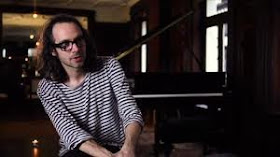Canberra Theatre Playhouse
27th October 2011
Reviewed by Bill Stephens
Until this year I had not heard of classical pianist, James Rhodes. However leading up to his Australian tour he seems to be all over the media. Everywhere were television documentaries, interviews and magazine articles about this slightly Woody Allen-ish concert pianist. Perhaps because so much of his publicity was concentrated on his drug and psychiatric problems, as well as his reported disdain for convention, I’d gained the impression that he was a cleverly packaged gimmick, likely to be a flash-in-the-pan and soon disappear. Therefore, though curious, as it was occurring in a busy theatre week, I decided that I wouldn’t bother attending his only Canberra concert. However when a late invitation came in, curiosity got the better of me, and I went along to see what all the fuss was about.
The stage of the Playhouse was bare of decoration except for a Steinway grand in a tight spotlight. James Rhodes strolled onstage, whippet-thin, dressed in non-descript black trousers, white tee-shirt and black cardigan, unkempt hair, scruffy beard.
He seated himself at the piano, bent over , stared at the keys intently, then commenced to play a single note five times which lead him into Alessandro Marcello’s lovely “Adagio from Oboe Concerto in d Minor”. He had my full attention.
Accepting the applause from the very respectably sized audience, he stood up, walked around the piano, and in a charming, well-modulated voice, launched into an explanation of what fascinated him about the piece of music he had just played. Then followed a witty stand-up comedy routine laced with references to Queen, the Minogue sisters, Viagra and drugs, to explain what was so fascinating about Beethoven’s challenging “Piano Sonata in C”, of which he then gave a mesmerizing performance.
No point nit-picking about wrong notes, it was the intensity, virtuosity and sheer pleasure with which he interpreted the music that was completely captivating.
Another entertaining chat and then on to Moskowski’s charming “Etude in F”, a dynamic, un-programmed performance of Rachmaninoff’s famous “Prelude in C Sharp Minor”, which he informed us was the bonus track, which lead into Chopin’s’ lovely “Romanza” and a dazzling performance of Busoni’s transcription of the Bach “Chaconne from Partita No. 2. in D Minor”.
By this time he had completely charmed his audience and had them shouting for more. He happily obliged with two encores and promised to be available in the foyer to meet them and sign the ubiquitous CD’s after the performance.
I too had been completely won over by his relaxed stage manner and pianistic virtuosity, and doubly delighted because, though James Rhodes is touted as flaunting the traditional classical concert format, what we had just witnessed was a thoroughly professional and captivating classical cabaret, which ticked all the boxes by taking its audience on an engaging musical discovery tour during which we had learned as much about the pianist as we did about his music.
